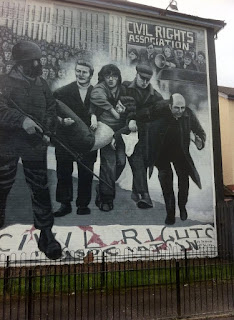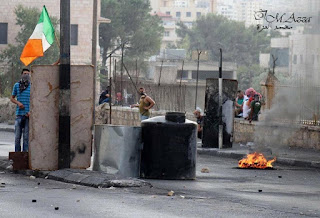Irish Current Affairs Blog of the Year 2018
 |
| Senator Frances Black with supporters in Dublin. |
Dear --------------,
I understand that in recent days the Fianna Fail party has stated its
intention to support the Control of Economic Activity (Occupied Territories)
Bill 2018 when it comes up for a vote in the Seanad. I would urge you and your
party to reconsider your support for the bill and work to prevent this bill
from passing.
In today’s uncertain times it is critical that countries and leaders
interested in facilitating a lasting peace amongst Israelis and Palestinians
not serve to empower the most radical, who have no interest in seeking peace.
Senator Frances Black’s legislation does just that by undercutting
Palestinians truly interested in peace and empowering Hamas terrorists and
recalcitrant Palestinians who refuse even to approach negotiations.
If you and the members of Fianna Fail truly want to see lasting peace
in the Middle East I would urge you to withdraw your support for this bill and
call for a return to the negotiating table.
Thank you for your consideration of this important matter.
Congressman Peter King.
.......................................... |
| Senator Frances Black with the Palestinian Ambassdor to Ireland during a talk in Co Galway earlier this year. |
It’s the arrogance that’s most striking.
This idea that a US Congressman knows better than an Irish politician about the measures required to bring lasting peace to the Middle East.
Even though the Irish politician who received this letter may actually have visited Israel and Palestine, and witnessed a terrible injustice with his own eyes.
Sometimes, when you look at the issues creating the headlines, it’s just as informative to examine those which aren’t.
Two weeks ago, a source within the Fianna Fail party provided me with an exact transcript of the above letter.
It was sent by a senior Irish-American Congressman, with a huge profile here in Ireland, in a bid to persuade his party to withdraw its support for the Control of Economic Activity (Occupied Territories) Bill.
To their credit, Fianna Fail supported Senator Frances Black’s bill last week, despite pressure from US Republicans and ‘informal’ visits from members of staff at the US Embassy in Dublin.
In many ways, they surprised us all.
But senior party figures visited the West Bank last July and saw for themselves the devastating impact the occupation and the settlements have had on Palestinian lives.
I expected the letter from Congressman Peter King, even though it was five months old, to cause a bit of a scandal.
 |
| Congressman Peter King wrote a letter to Fianna Fail |
Here we had evidence of US interference in Irish politics, from a Congressman who is closely linked to US President Donald Trump and his controversial executive order to ban people from seven mainly Muslim countries from travelling to the US last year.
Imagine the controversy, for example, if a Russian member of parliament had lobbied a senior American politician in such a fashion in relation to US foreign policy.
Apart from extensive coverage in one Sunday newspaper, this letter was largely ignored by the media in Ireland.
I wrote about it for both Electronic Intifada, the leading Palestinian website in English in the world, and Irish Central, which mainly caters for an Irish-American readership in the United States.
But it hardly merited a paragraph of coverage here in Ireland.
Senators in Dublin passed the legislation to ban the sale of goods or services from the settlements last week, with little or no coverage of this international dimension to the story.
If anything, Congressman King’s letter is just ludicrous.
The idea that Trocaire or Christain Aid Ireland, who support Senator Black’s bill, would “empower Hamas terrorists” is quite simply bizarre to anyone who knows anything about these respected NGOs who operate in a number of countries.
 |
| With Shawan Jabarin from the West Bank earlier this year. He won the Human Rights Prize of the French Republic this week. |
There is absolutely no connection to Hamas in Senator Black’s bill.
Does it even need to be said?
It would ban trade with goods and services from beyond the internationally recognised 1967 border, where more than 500,000 Israelis live in settlements in the West Bank and East Jerusalem.
The letter underlines the hypocrisy and double standards of Congressman King himself, who faced intense criticism in the 1990s for his attempts to bring Sinn Fein in from the cold.
Although he suggests that Hamas should be isolated, King encouraged dialogue with Irish republicans at a time when the British government was refusing to deal with them.
Senator Black told me last week that she condemned all violence.
It felt ridiculous even having to ask her. This is a woman who has dedicated her life to helping others, to entertaining people through music and song, through working as a counsellor, and inspiring people to deal with addiction issues.
In her short time in politics, she has been a shining example to others, by bringing varied groups together to find common cause. People are genuinely shocked that she received the cross-party support required to get her bill through the Seanad, bringing the likes of Sinn Fein, Fianna Fail, and the Labour Party together.
Indeed, the progress of this bill through the upper house could set a template for others.
No wonder politicians in Israel and the US are uncomfortable, because other countries are watching what's happening in Ireland - just as we led the way in the global campaign against Apartheid South Africa.
Senator Black pressed ahead with this bill because she wanted to respond to the call of civil society in Palestine for international solidarity, for measures to bring hope in the face of a brutal occupation which has now gone on for 51 years.
Both the UN and the EU consider the settlements to be illegal, but what exactly have they done in solidarity with the people who have had their land stolen by force over the past five decades?
What have they done for the villagers of the West Bank whose children have been terrorised by dawn raids for so long? For those who face degrading military checkpoints if they want to go to work or who are told they can only walk on one side of a street in Hebron?
In the last two days, Israeli Prime Minister Benjamin Netanyahu announced that the Government will authorise thousands of settler homes, built illegally on the stolen Palestinian land. So much for moving on with a "peace process" which has been a pipe dream for the past four years, as the settlements prevent any real chance of a "two state" solution ever occurring.
This Irish bill can and will set a precedent for other countries across the globe and is due before the Dail in the New Year.
Because of the current make-up of the Dail, it will pass if it continues to attract the support of Fianna Fail.
So it is disappointing, but perhaps not surprising, that pressure from a US Congressman for Fianna Fail to change its stance did not merit more coverage in the Irish media.
Aren’t we all guilty of hypocrisy, though?
Ireland is supposedly a ‘neutral’ country and yet we have allowed hundreds of thousands of US troops to pass through Shannon Airport over the past 17 years.
Perhaps our politicians are less forthcoming with the truth than US President Donald Trump, at least when it comes to prioritising jobs and the economy over justice and human rights.
When pressed over the murder of journalist Jamal Khashoggi in the Saudi consulate in Istanbul, Trump said he would not allow Saudi involvement in a brutal murder interfere with €110 billion worth of arms sales.
Who cares about the killings of thousands of children in Yemen, or the hacking to death of a columnist for the Washington Post, when there are billions worth of deals to be made?
Unlike Trump, who makes it clear that arms deals with Riyadh are more important than human lives, our Irish politicians would prefer if these kinds of awkward questions were never even asked in the first place.
* Ciaran Tierney won the Irish Current Affairs and Politics Blog of the Year award at the Tramline, Dublin, last month. Find him on Facebook or Twitter here. Visit his website here - CiaranTierney.com.
* You can subscribe to my blogs by clicking on the link at the top of this page
* To hire an award-winning blogger for your business blog, please email ciaran@ciarantierney.com.








































